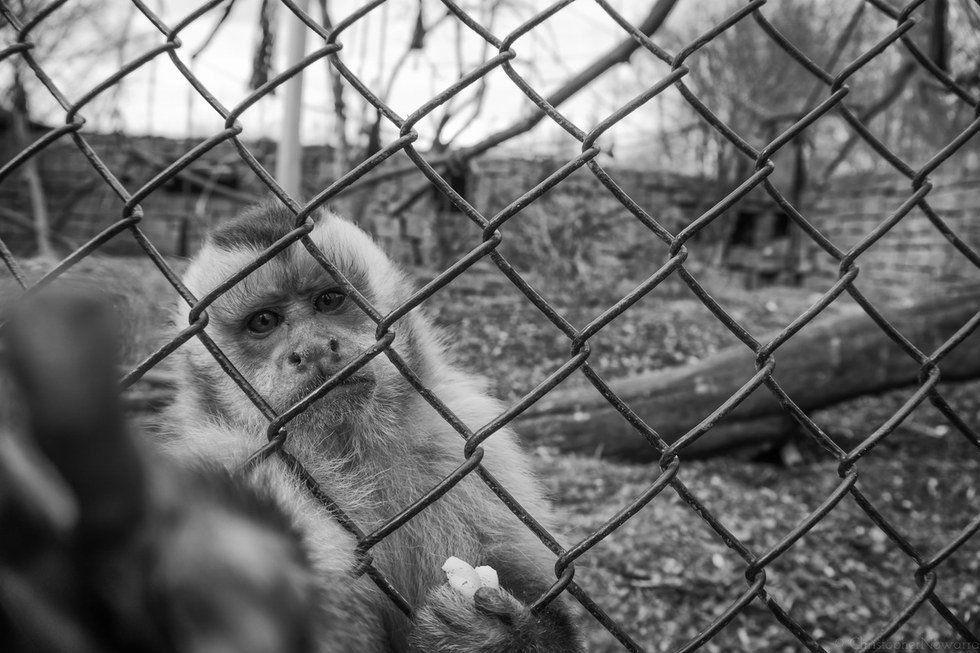I’m sure we can all remember going to the zoo when we were little- standing with your face pressed against the glass, watching a beautiful tiger gracefully walk around his exhibit or gawking at the cute baby monkeys swinging from branch to branch. It was so intriguing to see such animals up close and personal like that.
As I got older, I began to notice the abnormal behaviors most of the animals would reveal. When you take a closer look at zoos you realize how unhappy and unhealthy the animals really are. They don’t want to be kept in artificial environments, have people stare at them, listen to impatient children bang on the glass or have people flashing cameras in their faces. Being an animal lover, I felt awful about even going to the zoo anymore. I wanted to help, and most importantly I want to inform people about the horrifying things that could be going on in your local zoo.
First off, conservation, also known as the preservation of numerous species, is one thing. The majority of zoos claim that without their help, certain animals would become extinct. Zoos also claim that they only take the animals in most need of their care. If only this were true. If zoo owners were really concerned with preserving the lives of animals, they would instead aim to preserve their natural habitats rather than capturing them. In fact, most animals at the zoo are not endangered, orphaned or injured at all and many of them are captured straight from the wild, their natural habitats. These animals are deprived of everything that is natural and important to them such as climate, habitats and properly feeding them. No amount of branches, grass, water provided in their cage or a beautiful their background can compare to an animal’s natural habitat in the wild.
Elephants living in the wild are known to travel many, many miles a day in large herds. In a zoo environment, elephants are normally only kept in pairs, and sometimes completely isolated. Their enclosures are incredibly small, enabling them to walk around a lot. These big, magnificent animals are known to be very social creatures, but in the zoo they show signs of being bored or even stressed out. The average lifespan of an elephant in the wild is 50-70 years. The average life span of one kept in confinement is an unfortunate 16-18 years.
Zoos also claim they are a great source of education and research. While most zoos make an effort to teach the public about the animals on display, they only teach them how animals act in captive situations. The profuseness of signs, elaborate pictures, diagrams and descriptions do absolutely nothing to educate the public, as many visitors ignore or forget the information they have read at the end of the day. Zoos are also known to teach children and adults that is in in fact acceptable to confine such beings and also teaches them disrespect for life. As for research, few zoos practice reliable and relevant research on their animals. Most species in the wild develop immunities to illnesses, whereas in a zoo, they are unable to build a strong immune system. Leading them to be more vulnerable to diseases and sicknesses sometimes causing death.
Many animals that have been held captive have shown abnormal behaviors. This case is known as “zoochosis”. This strange change in behaviors is a result of boredom, depression and lack of both physical and mental enhancement. You have most probably seen zoochosis first hand if you have ever seen an animal biting the bars of it’s cage, walking around in circles or pacing, rocking or swaying back and forth, excessive licking and grooming, or even consuming or playing with feces.
If none of that disturbs you then how about this one. Most zoos face something known as a “surplus” of animals. When a cute baby lion that was once a crowd pleaser grows up and becomes not as popular anymore, they often sell the animals or even kill them. Animals who are known to breed often such as deer, tigers and lions are mainly sold to hunting ranches where hunters pay money to hunt the animals that have no chance as they are trapped in a fenced area. If that's not the case, they will sometimes be sold to roadside zoos, private individuals as exotic pets, laboratories for experimental purposes, pet shops, circuses, or even exotic meat industries.
Now that I have revealed the terrible things zookeepers and zoo owners are hiding from you, here are a few things you can do to help these poor, innocent animals in need of proper care. For starters, you can boycott visiting zoos and petting zoos and start patronizing non-exploitive organizations and non-profit animal sanctuaries instead of patronizing your local zoo. If you really feel enraged by this issue, you can write to your elected officials and demand stricter Animal Welfare Act regulations and encourage to increase USDA (the United States Department of Agriculture) inspections. And of course, educate others about the reality of zoos by sharing this article with your friends and family.
I love animals very much, and I only want what is best for them, and that is to regain their freedom in a natural environment where they can grow and be the wild animals they are supposed to be.





















